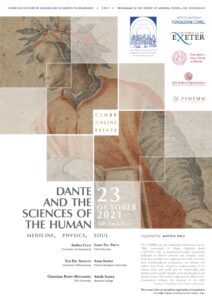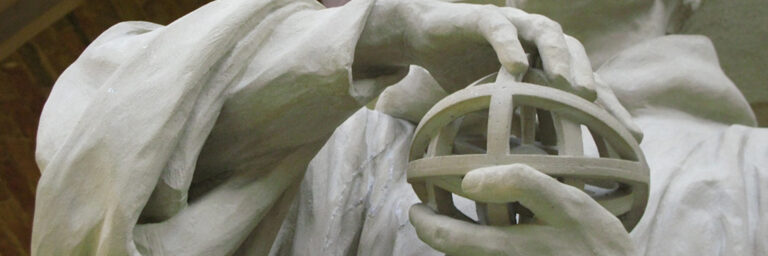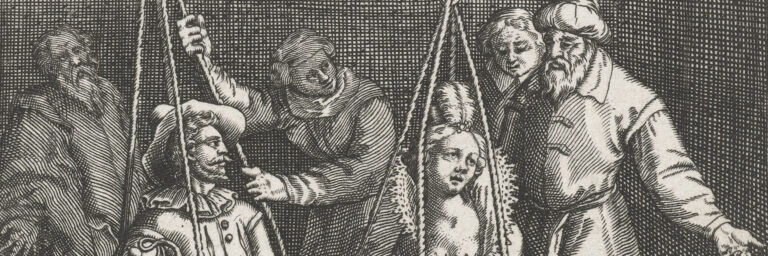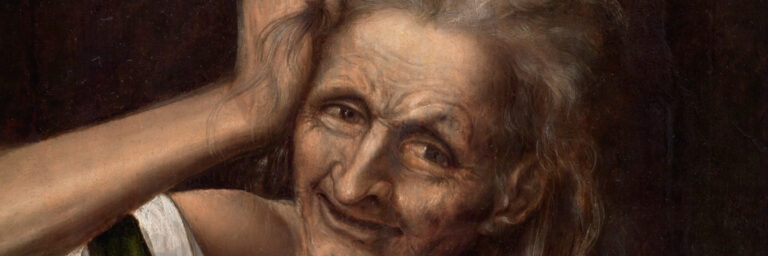Dante and the Sciences of the Human
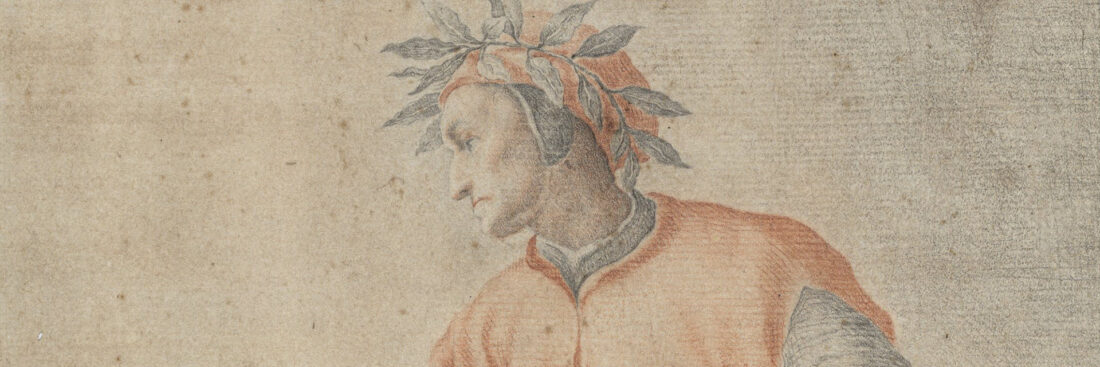
Dante and the Sciences of the Human
Medicine, Physics, Soul
Organised by
Matteo Pace
23 October 2021 – 3.30 PM (CET)
The CSMBR joins the worldwide celebrations for the 700th anniversary of Dante Alighieri’s death (1321-2021) with an international online symposium dedicated to Dante’s poetical and scientific mind. Gathering scholars who approach his work and times from interdisciplinary perspectives, the webinar will
address how Dante shaped an understanding of the human body and mind, and his relationship with medical and scientific thought in his philosophical and literary oeuvre. The event is organized by Matteo Pace (Connecticut College), the recipient of the 2020 Santorio Award for Excellence in Research.
This talk is an investigation of how the cantos of the thieves problematize the ontological status of a thing, specifically, the distinction between a thing and an object when considering the acts of “change” and “exchange” with which theft, and its punishment in Hell, presents us. When does a familiar object—even something as intimate and unique as a body part—become an estranged thing, and vice versa? At what point does it signify differently?
Dante’s word choice, imagery, and syntax in Inf. 24 and 25 reflect the instability of things in both the material world and in the world of language. He challenges us to consider our understanding of ownership and identity, and what is really lost and gained in appropriating what is not, by law or by nature, ours.
About the Speaker…
Arielle Saiber is Professor of Italian Studies at Bowdoin College. She has published primarily on medieval and early modern Italian literature, the history of mathematics, and science fiction. Her books include Measured Words: Computation and Writing in Renaissance Italy (2017), and the co-edited anthology Images of Quattrocento Florence: Writings on Literature, History and Art (2000).
This paper focuses on a few loci in the Comedy, in which Dante compares Florence to a human body, the harm or illness of which stand for corruption and flaws affecting the city as a polity. Medical allegories of the body politic are relatively common in scholastic literature. They ultimately stem from Plato, Aristotle, and the vast Greek-Arabic and Latin tradition of their interpreters.One example of this tradition over which I will briefly linger is al-Fārābī’s treatise on the virtuous city (Kitāb arā’ ahl al-
madīnah al-fāḍilah), in which the body politic is a city (madīna), rather than principalities or kingdoms, as often in Medieval political thought (Dante’s De Monarchia included). The paper suggests a political-philosophical reading of some of the references to Florence in the Comedy. In a theological-political perspective, the ultimate “source of the ills in the city” (Par. 16: 67-69) is the city’s aspiration to self-governing.
About the Speaker…
Andrea Celli teaches Italian and Mediterranean Studies at the University of Connecticut. His current research projects include a study on early-modern representations of Hagar and Ishmael, as genealogical symbols of religious conflict; and a long essay on the ‘afterlife’ of Saladin in Counter-Reformation literature.
In January 1320, Dante Alighieri famously lectured in a church of Verona on the meteorological problem of the relation between the sphere of the earth and that of water. Modern scholars have often regarded Dante’s Quaestio as the final refutation of the apparently nonsensical, yet common doctrine postulating that the surface of the ocean would be higher than dry land – with sources and rivers thereby flowing “upwards”. In this talk, I intend to reassess the theory Dante so forcefully rejected by placing it
within the wider context of medieval meteorology. In particular, I argue that this doctrine met with widespread popularity because, among other reasons, it offered plausible solutions to real physical problems that other schemes (included Dante’s favorite) struggled to address. Generally seen as an example of failed reasoning and logical fallacies, it shows, on the contrary, the capacity of medieval thinkers and of their readers to accept explanatory models that transcended the immediate perception of the senses.
About the Speaker…
Ivano Dal Prete is a senior lecturer at Yale University. He has taught and conducted research at the University of Minnesota, Columbia University, Harvard/Villa I Tatti (Florence), the Huntington Library (Pasadena), and the Italian Academy for Advanced Studies in America. He has published extensively on the history of early modern Earth sciences, astronomy, popular science, and scientific communication networks.
Renaissance treatises on love often rely on the authority of poets, particularly Petrarch and, later, Ariosto. This happens for good reason, especially in those sections dealing with love as a sickness. Yet occasionally also Dante is used as an authority. This paper investigates the recurring patterns in the use of Dante in Renaissance love treatises, which offer insights into a scarcely investigated aspect of his early modern reception.
About the Speaker…
Eva Del Soldato is an Associate Professor at the University of Pennsylvania. Trained in Philosophy and Intellectual History at the Scuola Normale Superiore di Pisa, her research is primarily devoted to Renaissance thought and culture. She is the author of the monographs Simone Porzio (2010) and Early Modern Aristotle. On the Making and Unmaking of Authority (2020).
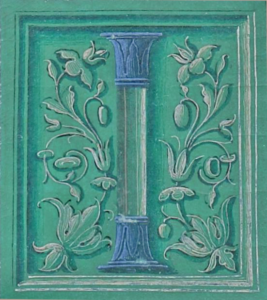
A Natural Resurrection? On God’s Creation of the Human Body in Paradiso 7.
Christiana Purdy-Moudarres
In canto 7 of Paradiso, Dante-pilgrim is faced with a conundrum regarding God’s creation of the human body. Beatrice has just distinguished between what God creates immediately (“sanza mezzo” [7.142]) and what he delegates to his angelic intermediaries: while the former – i.e., the spiritual realm that they’re now passing through – is incorruptible, the latter – the material realm they’ve left behind – is subject to corruption. The distinction is not unusual by 14th century standards.
The implication seems to be that God’s immediate creation includes the human body, thereby rendering it incorruptible. Hence the necessity of the resurrection. Or so it did to commentators until about a century ago. In this lecture, I propose a rehabilitation of the once standard reading of these lines based on a thus far untapped source of inspiration. I track the origins and westward journey of this doctrine into Dante’s theological milieu.
About the Speaker…
Christiana Purdy Moudarres is an Assistant Professor of Italian and Medieval Studies at Yale University. She received her PhD in Italian from the same institution, followed by a Master of Arts in Religion at Yale Divinity School, where she specialized in historical theology. Her work focuses on Dante and the intersections of medieval science and religion. Other areas of interest include transhumanism and gender studies.
About the Organiser...
Matteo Pace is a medievalist specializing in Italian cultures of the 13th and 14th centuries.
In his research, he focuses on how Medieval vernacular poetry shaped the reception of Ancient medical thought (especially Aristotle and Galen) through the uses of poetical images centered around the body. He is also interested in how the theories on body and soul informed the ways in which Medieval poetry articulated its
its tropes, and vice versa. He just completed a doctoral dissertation titled “Of Poets and Physicians: Medical and Scientific Thought from the Sicilian School to Dante, 1230-1300,” in which he explores the varied networks of Medieval cultures through the history of Italian literature and the cultural reception of ancient medicine, with a focus on sense-perception, memory, physiology, bodily determinism and free will.



